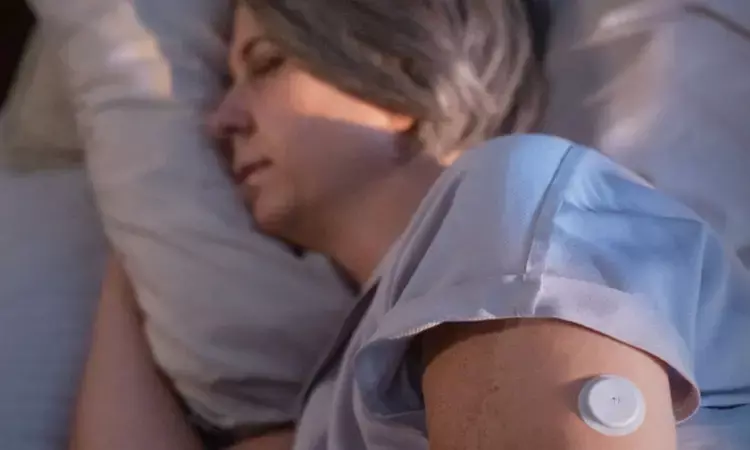- Home
- Medical news & Guidelines
- Anesthesiology
- Cardiology and CTVS
- Critical Care
- Dentistry
- Dermatology
- Diabetes and Endocrinology
- ENT
- Gastroenterology
- Medicine
- Nephrology
- Neurology
- Obstretics-Gynaecology
- Oncology
- Ophthalmology
- Orthopaedics
- Pediatrics-Neonatology
- Psychiatry
- Pulmonology
- Radiology
- Surgery
- Urology
- Laboratory Medicine
- Diet
- Nursing
- Paramedical
- Physiotherapy
- Health news
- Fact Check
- Bone Health Fact Check
- Brain Health Fact Check
- Cancer Related Fact Check
- Child Care Fact Check
- Dental and oral health fact check
- Diabetes and metabolic health fact check
- Diet and Nutrition Fact Check
- Eye and ENT Care Fact Check
- Fitness fact check
- Gut health fact check
- Heart health fact check
- Kidney health fact check
- Medical education fact check
- Men's health fact check
- Respiratory fact check
- Skin and hair care fact check
- Vaccine and Immunization fact check
- Women's health fact check
- AYUSH
- State News
- Andaman and Nicobar Islands
- Andhra Pradesh
- Arunachal Pradesh
- Assam
- Bihar
- Chandigarh
- Chattisgarh
- Dadra and Nagar Haveli
- Daman and Diu
- Delhi
- Goa
- Gujarat
- Haryana
- Himachal Pradesh
- Jammu & Kashmir
- Jharkhand
- Karnataka
- Kerala
- Ladakh
- Lakshadweep
- Madhya Pradesh
- Maharashtra
- Manipur
- Meghalaya
- Mizoram
- Nagaland
- Odisha
- Puducherry
- Punjab
- Rajasthan
- Sikkim
- Tamil Nadu
- Telangana
- Tripura
- Uttar Pradesh
- Uttrakhand
- West Bengal
- Medical Education
- Industry
Clock-Based Method May Miss Nocturnal Hypoglycemia in Diabetes Patients: Study Calls for Sleep Trackers

UK: In a recent analysis, the Hypo-METRICS study has shed light on the prevalence of nocturnal hypoglycemia and sleep-related hypoglycemia among individuals with diabetes. The researchers compared the rates of clock-based nocturnal hypoglycemia and hypoglycemia while asleep among patients with diabetes.
The study, published in Diabetes Technology & Therapeutics, revealed that the traditional clock-based approach for assessing nocturnal hypoglycemia may underestimate hypoglycemia while asleep in patients with type 1 and type 2 diabetes.
Nocturnal hypoglycemia refers to low blood sugar levels that occur during sleep. In contrast, sleep-related hypoglycemia encompasses low blood sugar incidents that may affect an individual's sleep patterns or overall well-being. Nocturnal hypoglycemia is typically measured between 00:00 and 06:00. However, these time frames may not align with actual sleeping patterns, raising questions about whether this approach introduces bias.
Against the above background, Gilberte Martine-Edith, King's College London, London, United Kingdom, and colleagues aimed to compare the rates of hypoglycemia occurring during sleep with those of clock-based nocturnal hypoglycemia in adults with type 1 diabetes (T1D) or insulin-treated type 2 diabetes (T2D). Specifically, they examined how often hypoglycemic episodes happen during sleep versus at specific nighttimes based on a clock schedule in these populations.
Participants in the Hypo-METRICS study used a blinded continuous glucose monitor and a Fitbit Charge 4 activity monitor for 10 weeks. They tracked hypoglycemic events through a smartphone app. Hypoglycemia detected by the sensor (SDH) and reported by participants (PRH) were classified into nocturnal (00:00–06:00) versus diurnal and into occurrences during sleep versus wakefulness, as indicated by the Fitbit sleep data. Paired-sample Wilcoxon tests were employed to analyze differences in hypoglycemia rates across these categories.
The study led to the following findings:
- 574 participants [47% T1D, 45% women, 89% white, median age 56 years, and hemoglobin A1c 7.3%] were included.
- Median sleep duration was 6.1 h, bedtime and waking time ∼23:30 and 07:30, respectively.
- There were higher median weekly rates of SDH and PRH while asleep than clock-based nocturnal SDH and PRH among people with T1D, especially for SDH <70 mg/dL (1.7 versus 1.4).
- Higher weekly rates of SDH while asleep than nocturnal SDH were found among people with T2D, especially for SDH <70 mg/dL (0.8 versus 0.7).
"Using the 00:00 to 06:00 time window as a proxy for sleep may lead to an underestimation of hypoglycemia occurring during actual sleep periods," the researchers wrote.
"Future research on hypoglycemia should incorporate sleep trackers to more accurately capture and reflect episodes of hypoglycemia during true sleep intervals," they concluded.
Reference:
Martine-Edith G, Divilly P, Zaremba N, Søholm U, Broadley M, Baumann PM, Mahmoudi Z, Gomes M, Ali N, Abbink EJ, de Galan B, Brøsen J, Pedersen-Bjergaard U, Vaag AA, McCrimmon RJ, Renard E, Heller S, Evans M, Cigler M, Mader JK, Speight J, Pouwer F, Amiel SA, Choudhary P, Hypo-Resolve FT. A Comparison of the Rates of Clock-Based Nocturnal Hypoglycemia and Hypoglycemia While Asleep Among People Living with Diabetes: Findings from the Hypo-METRICS Study. Diabetes Technol Ther. 2024 Jul;26(7):433-441. doi: 10.1089/dia.2023.0522. Epub 2024 Apr 17. PMID: 38386436.
Dr Kamal Kant Kohli-MBBS, DTCD- a chest specialist with more than 30 years of practice and a flair for writing clinical articles, Dr Kamal Kant Kohli joined Medical Dialogues as a Chief Editor of Medical News. Besides writing articles, as an editor, he proofreads and verifies all the medical content published on Medical Dialogues including those coming from journals, studies,medical conferences,guidelines etc. Email: drkohli@medicaldialogues.in. Contact no. 011-43720751


